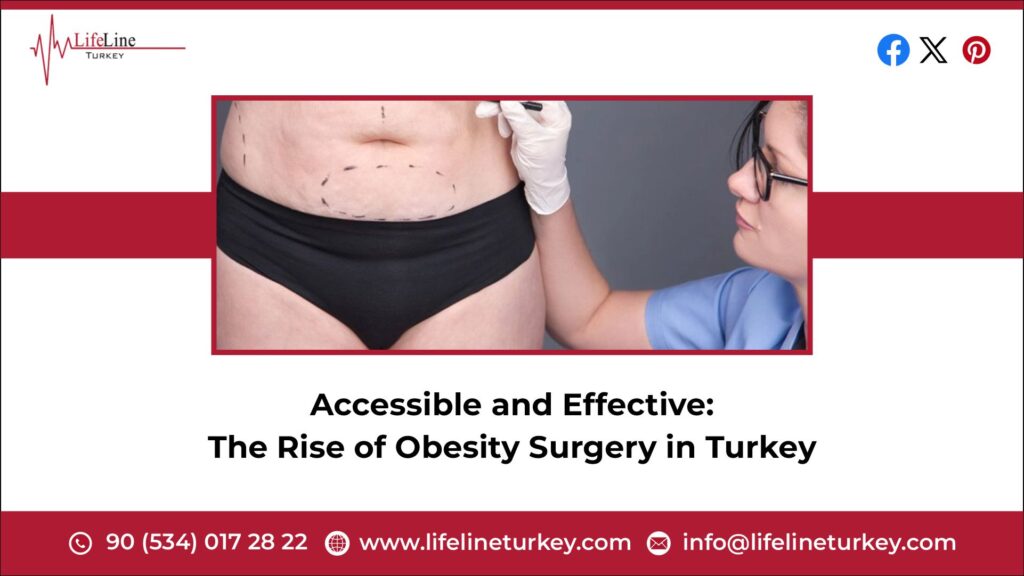Obesity can cause severe mental distress and be extremely stressful for individuals. Peer pressure and social disdain can influence the decision to undergo weight loss surgery. Due to the increasing demand for effective weight loss solutions and advancements in medical science, obesity surgery in Turkey has become highly sought after. This surgery has helped several patients lose weight. Reducing body fat through surgery can lead to a healthy and ideal lifestyle.
LifeLine Turkey has been assisting individuals in overcoming their insecurities across Western countries by offering plastic surgeries, dental treatment, hair transplants, stem cell therapy, IVF treatment, and bariatric surgery. This blog will help you learn more about weight loss surgery in Turkey.
Reasons to Go for Weight Loss Surgery
Opting for an obesity surgery can yield extraordinary benefits. The following are some of the changes that occur after surgery:
- Permanent Medical Advantages: According to research, people with bariatric surgery generally live longer, have lower mortality rates from obesity, and have normalized metabolic processes, including blood sugar and cholesterol levels. These benefits all contribute to improved overall health.
- Improved Living Conditions: Following surgery, patients frequently report better quality of life, improved mobility, more energy, enhanced emotional health, decreased anxiety and depression, higher self-esteem, and escalated social involvement.
- Improvement of Obesity-Related Conditions: People frequently undergo bariatric surgery to treat obesity-related diseases such as Type 2 diabetes, high blood pressure, sleep apnea, joint discomfort, and cholesterol.
- Remarkable Weight Loss: This is a popular treatment option for patients who have not responded to conventional fat loss procedures. It provides a more effective means of achieving significant and long-term weight loss, with results often showing a 30–40% reduction in body mass within the first year.
- Proactive Health Practices: Bariatric surgery is a preventive intervention for those who are obese and at risk of severe health disorders. It can help patients avoid certain diseases that could have a significant negative impact on their quality of life and overall health.
- Enhanced Exercise: After excessive fat reduction surgery, patients frequently find it easier to do physical activities that were difficult earlier because of being overweight; this also helps them lose weight and enhances their general physical health and well-being.
- Mental Health Benefits: Being obese can affect one’s mental health, increasing feelings of loneliness, guilt, and sadness. Losing extra fat, however, can improve social connections, mental health, and physical image while boosting confidence.
Changes after Undergoing Bariatric Surgery
A weight loss surgery can bring significant changes due to the emotional, mental, and physical factors associated with obesity. This surgery can be a turning point for individuals. Some noteworthy changes can be:
Physical Changes:
- Long-term success following surgery depends on having a strong support network, which includes friends, family, and support groups. Patients frequently find that they can share challenges and experiences with their loved ones.
- Although losing weight can improve social interaction and relationships, there may be difficulties for individuals to get used to their new bodies and the attention they receive.
- Patients with more energy and mobility can participate in physical activities, improving their general fitness and way of life.
Emotional Changes:
- To keep a positive relationship with food, patients must learn to accept lower portions and nutrient-dense foods, which requires constant adherence to dietary recommendations.
- Losing fat can improve mental health by dramatically lowering anxiety and depression, as well as boosting social engagement and confidence in patients.
- Patients frequently report better body image and self-esteem after surgery.
Lifestyle Changes:
- Following surgery, patients frequently experience hair loss as a stress reaction that normally goes away in a few months.
- Patients losing excessive fat may see changes in their body composition, such as increased skin, which could make them think about having body contouring treatments done.
- Due to changes in the digestive tract, patients may develop nutritional deficiencies, particularly in iron, calcium, and vitamin B12. Regular monitoring and supplementation are necessary for these patients.
- Bariatric loss surgery can resolve obesity-related medical conditions like type 2 diabetes, hypertension, and sleep apnea; research shows that 85% of patients with type 2 diabetes experienced significant improvements or full resolution after surgery.
- In 18–24 months, patients typically lose 50–70% of their excess mass, and they frequently maintain this weight loss effectively.
Dietary Guidelines: Post-Bariatric Surgery
Once surgery is complete, you must follow certain precautions. These instructions include:
- Include strength training two to three times a week and 150 minutes of aerobic activity in your routine to maintain your weight and overall health.
- Make routine consultations with a dietician or other healthcare professional to discuss any concerns, modify diet plans, and check nutritional status.
- Following surgery, start with a liquid diet and work your way up to pureed and solid foods. Until your tolerance improves, stay away from raw vegetables, tough meats, and high-fiber foods.
- Keeping a food journal facilitates dietary adherence, prevents weight gain, and tracks food intake and portion sizes.
- Chew food 20–30 times, or until it’s crushed or mashed, to help with digestion and avoid pain.
- To accommodate a smaller stomach, eat three small meals and three snacks a day, with portions of 1/3 to 1/2 cup for each meal.
- Consume 60–80 grams of protein per day from lean meats, poultry, fish, eggs, dairy products, tofu, and protein supplements as necessary to help recover and preserve muscle mass.
- To prevent deficiencies, bariatric patients should take a daily multivitamin supplement that contains calcium citrate and vitamin D3, with additional supplements based on individual needs.
- To minimize discomfort, drink 6–8 cups of water per day, stay away from carbonated drinks, alcohol, and sugary drinks, and avoid fluids 30 minutes before, during, or after meals.
- Choose nutrient-dense foods like cooked vegetables, whole grains, and lean meats over calorie-dense ones like sweets, sugary drinks, fried foods, and processed snacks.
Transform Your Life with Bariatric Surgery in Turkey!
If you are looking for a permanent solution for your weight loss surgery in Turkey, you can rely on Lifeline medical consultants. We have an excellent customer satisfaction rate, and our expert surgeons and doctors perform the surgery with utmost precision. We are well equipped with the latest technologies and equipment. Our doctors can help you create a new life for yourself by supporting your physical transformation. Kindly go through our website, Lifeline Turkey.com, for more details.



